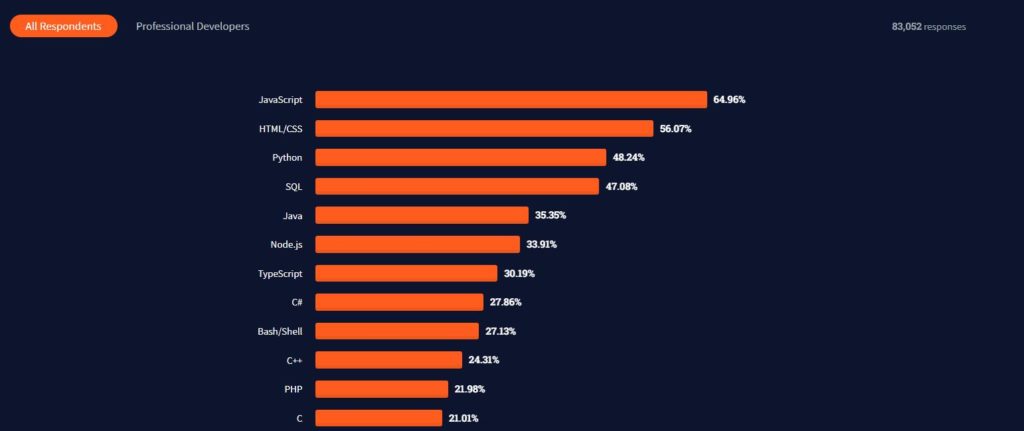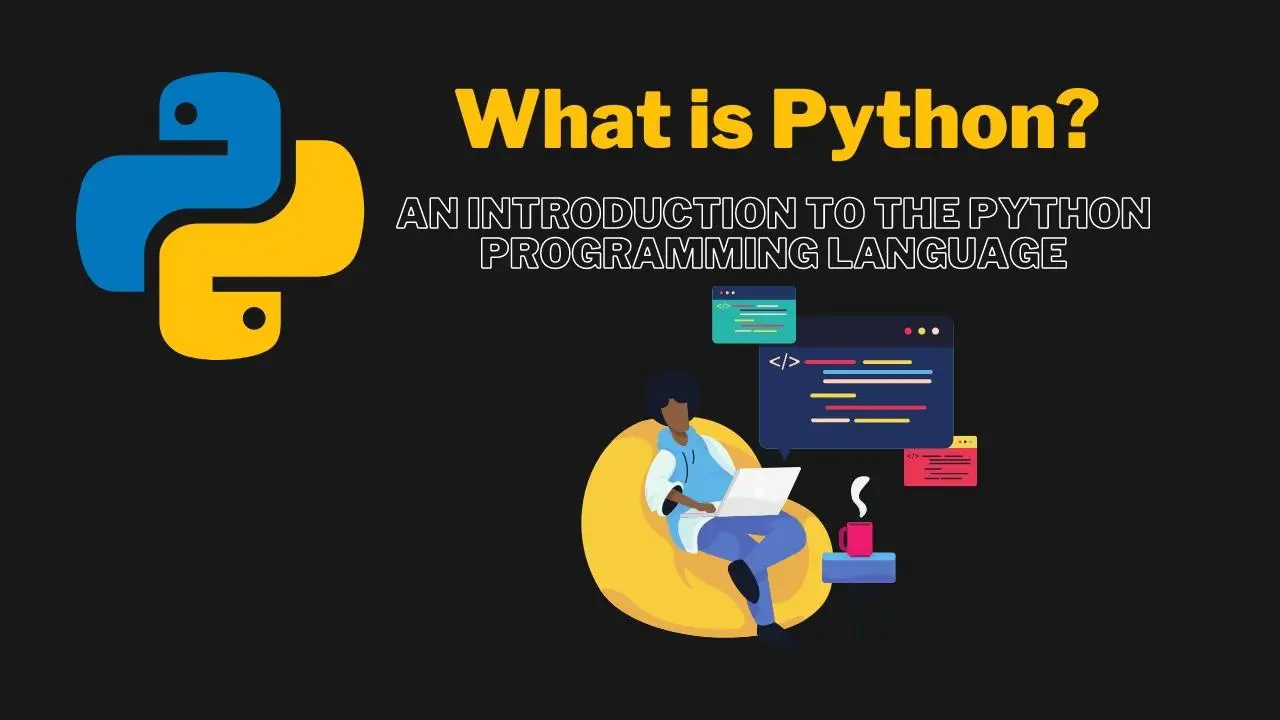The Python programming language has seen an incredible rise in popularity over the past couple of years, mainly because it is one of the easiest programming languages a beginner can pick up. Python has made it into the curriculum of many universities and schools, replacing harder-to-learn languages like C and C++. Python is also one of the programming languages that sees a very high demand for jobs in the fields of AI and machine learning. In this introductory post, you will learn what Python is and what Python is used for.
Table of Contents
What is Python?

The Python programming language was created in the 1990s by Guido van Rossum with the goal of simplifying software development. It is now one of the most popular programming languages in the world and powers major sites like YouTube and Instagram.
One reason Python is great for beginners is that it reads like English. For example, take a look at this line of code:
print("Hello, world!")
Notice how similar it looks to English? This makes Python simpler to learn than other languages, which can use a different syntax. In addition, there are many free resources online for learning Python.
Python is a very versatile language that you can use for building web applications, creating data visualizations, performing mathematical computations, and much more. In fact, 55% of StackOverflow respondents said they used Python for data analysis, and 48% used it for scientific computing in 2022.
Some common applications of Python include automating repetitive tasks, powering major sites like Google and Instagram, building games (like Minecraft!), and running AI and machine learning algorithms.
What is Python used for?
Python has many different applications, but some of the most notable ones would be:
- Data Science
- Artificial Intelligence
- Machine Learning
- Web Development
- Ethical Hacking
Python in Data Science
Python is one of the most popular languages for data science and analytics due to its simplicity and wide range of powerful libraries for working with data. With Python, users can easily perform tasks such as extracting and cleaning up data, building predictive models, analyzing text and images, visualizing datasets, and much more.
Some of the most popular Python libraries for data science include NumPy, SciPy, Pandas, and Matplotlib. These libraries provide easy-to-use tools for working with numbers and performing mathematical calculations, handling data in tables, analyzing text, processing images, structuring datasets for machine learning models, etc.
As the amount of digital data continues to grow at an exponential rate, Python is becoming increasingly important for data science and analytics. Whether you are a data scientist or just getting started with data analysis, Python is a powerful tool that can help you gain insights and make better decisions.
Python in Artificial Intelligence (AI)
Along with machine learning, Python is one of the most popular technologies for building AI applications. This is because Python offers a range of powerful libraries and tools for working with data, such as NumPy, SciPy, TensorFlow, Keras, Pytorch, etc. These libraries enable developers to easily build machine learning models and train them on large datasets.
Some common applications of Python in AI include natural language processing (NLP), image recognition, speech recognition, predictive analytics, and much more. With Python, developers can create intelligent systems that are capable of understanding human input and making accurate predictions based on historical data.
There is no doubt that Python will continue to play an important role in the development of AI technologies and applications. As data science becomes more critical for businesses, it is likely that we will see increased demand for Python programmers who are skilled in machine learning and AI.
Python in Machine Learning
Like artificial intelligence, machine learning is one of the most important technologies for building intelligent systems and applications. Python is a popular choice for machine learning due to its powerful libraries, such as SciPy, NumPy, TensorFlow, Keras, and Pytorch. These libraries make it easy for developers to build models that can automatically learn from data sets without being explicitly programmed.
Some common applications of Python in machine learning include natural language processing, speech recognition, predictive analytics, recommendation systems, computer vision, and more. With Python’s tools for working with data, developers can build intelligent applications that can analyze text, images, sounds, and other types of inputs to make accurate predictions and recommendations.
Python in Web Development
Python is also a popular choice for web development thanks to its simplicity, flexibility, and a large collection of open-source libraries. With Python, developers can quickly build web applications using frameworks like Django and Flask, or they can use tools like Google App Engine to create cloud-based apps.
Some notable companies that have built their websites using Python include Instagram, Pinterest, Reddit, Dropbox, and Quora. If you are interested in a career in web development, learning Python can be a great place to start. There is a large community of Python developers online who are always willing to share their knowledge and help others learn the language. So whether you are just getting started or looking for more advanced resources, there is something for everyone when it comes to learning Python.
Python in Ethical Hacking
Python is also widely used in the field of ethical hacking or penetration testing. With Python, developers can create powerful tools to help them identify and prevent security vulnerabilities in software applications. Some common examples of these tools include fuzzing tools like Sulley and web application scanners like Skipfish.
Given its popularity among hackers, Python is often included in cybersecurity and forensics programs at universities and other educational institutions. Additionally, there is a large community of Python developers who share their knowledge and work together to help identify and resolve security issues in software applications built with Python. If you are interested in pursuing a career in ethical hacking or cybersecurity, then learning Python can give you the skills you need to succeed in this growing field.
There are also entire books written on the topic of Python for Ethical Hacking. Some of them are included in our popular Hacking Books list, too!
Summary
Python is a versatile programming language that is widely used in a variety of fields, including AI, data science, web development, and ethical hacking. Whether you are just a beginner or looking to advance your skills, there are plenty of resources available to help you learn Python and develop the skills needed for success in these areas. So if you are interested in a career in machine learning, web development, or ethical hacking, then learning Python is a great place to start.
The best place to get started with learning Python is our Python Starter Section. To continue with the next step, which is installing Python on Windows, macOS, or Linux, click the button below.


HI STEFAN,
CONGRATS TO ALL YOUR SUCCESS! THANKS FOR YOUR TIME AND ENERGY. I USE CAPS TO SEE BETTER. DO YOU SOMETHING THAT LIST ALL PYTHON SYNTAX IN ONE PLACE. I’D LIKE TO MASTER THE PYTHON SYNTAX FIRST. THANKS
Sure thing, Ronnie. Thanks for the comment!